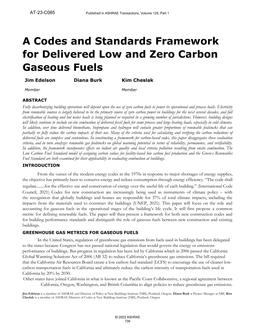
C085 — A Codes and Standards Framework for Delivered Low and Zero Carbon Gaseous Fuels
- Comments Off on C085 — A Codes and Standards Framework for Delivered Low and Zero Carbon Gaseous Fuels
- ASHRAE
Click here to purchase
Fully decarbonizing building operations will depend upon the use of zero carbon fuels to power its operational and process loads. Electricity from renewable sources is largely believed to be the primary source of zero carbon power in buildings for the next several decades, and full electrification of heating and hot water loads is being planned or required in a growing number of jurisdictions. However, building designs will likely continue to include on-site combustion of delivered fossil fuels for some process and large heating loads, especially in cold climates. In addition, over time delivered biomethane, biopropane and hydrogen will contain greater proportions of renewable feedstocks that can partially or fully reduce the carbon impacts of their use. Many of the criteria used for calculating and verifying the carbon reductions of delivered fuels are complex and contentious. In constructing a framework for carbon-based codes, this paper disaggregates those evaluation criteria, and in turn analyzes renewable gas feedstocks on global warming potential in terms of reliability, permanence, and verifiability. In addition, the framework incorporates effects on indoor air quality and local criteria pollution resulting from onsite combustion. The Low Carbon Fuel Standard model of assigning carbon values for facility-based low carbon fuel production and the Green-e Renewables Fuel Standard are both examined for their applicability in evaluating combustion at buildings.
Product Details
- Published:
- 2023
- Number of Pages:
- 8
- Units of Measure:
- Dual
- File Size:
- 1 file , 1.6 MB
- Product Code(s):
- D-AT-23-C085
- Note:
- This product is unavailable in Russia, Belarus

